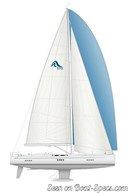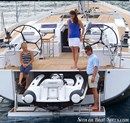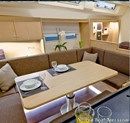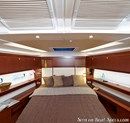Hanse 575 Standard
Sailboat specifications
The Hanse 575 is a 54’10” (16.7m) cruising sailboat designed by Judel/Vrolijk (Germany). She was built since 2012 (and now discontinued) by Hanse (Germany).
The Hanse 575 is as well listed, on Boat-Specs.com, in Shoal draft version (see all the versions compared).
The Hanse 575 is as well listed, on Boat-Specs.com, in Shoal draft version (see all the versions compared).
Hanse 575's main features
- Model
- Hanse 575
- Version
- Standard
- Hull type
- Monohull
- Category
- Offshore cruising sailboat
- Sailboat builder
- Sailboat designer
- Country
- Germany
- Construction
- GRP (glass reinforced polyester):
- Hull: Single skin fiberglass polyester
- Deck: Sandwich balsa fiberglass polyester - First built hull
- 2012
- Last built hull
- Discontinued
- Appendages
- Keel : T-shaped keel (with bulb)
- Helm
- Twin helm wheels
- Rudder
- Single spade rudder
- Unsinkable
- No
- Trailerable
- No
- EC design categoryiThe CE design category indicates the ability to cope with certain weather conditions (the sailboat is designed for these conditions)
A: Wind < force 9, Waves < 10m
B: Wind < force 8, Waves < 8m
C: Wind < force 6, Waves < 4m
D: Wind < force 4, Waves < 0,5m - A
- Standard public price ex. VAT (indicative only)
- About382 000 €(2015)
Hanse 575's main dimensions
- Overall length
- 56’ 4”17.15 m
- Hull length
- 54’ 10”16.7 m
- Waterline length
- 49’ 8”15.15 m
- Beam (width)
- 17’ 1”5.2 m
- Draft
- 9’ 5”2.85 m
- Mast height from DWL
- 83’25.3 m
- Light displacement (MLC)
- 42990 lb19500 kg
- Ballast weight
- 13007 lb5900 kg
- Ballast type
- Cast iron
Hanse 575's rig and sails
- Upwind sail area
- 1738 ft²161.5 m²
- Downwind sail area
- 3202 ft²297.5 m²
- Mainsail area
- 942 ft²87.5 m²
- Genoa area
- 797 ft²74 m²
- Jib area
- 678 ft²63 m²
- Gennaker area
- 2260 ft²210 m²
- IiFore triangle height (from mast foot to fore stay top attachment)
- 67’ 11”20.7 m
- JiFore triangle base (from mast foot to bottom of forestay)
- 21’6.4 m
- PiMainsail hoist measurement (from tack to head)
- 68’ 11”21 m
- EiMainsail foot measurement (from tack to clew)
- 23’ 4”7.1 m
- Rigging type
- Sloop Marconi 9/10
- Mast configuration
- Keel stepped mast
- Rotating spars
- No
- Number of levels of spreaders
- 2
- Spreaders angle
- Swept-back
- Spars construction
- Aluminum spars
- Standing rigging
- 1x19 strand wire
Hanse 575's performances
- Upwind sail area to displacementiThe ratio sail area to displacement is obtained by dividing the sail area by the boat's displaced volume to the power two-thirds.
The ratio sail area to displacement can be used to compare the relative sail plan of different sailboats no matter what their size.
Upwind: under 18 the ratio indicates a cruise oriented sailboat with limited performances especially in light wind, while over 25 it indicates a fast sailboat. - 240 ft²/T22.29 m²/T
- Downwind sail area to displacementiThe ratio sail area to displacement is obtained by dividing the sail area by the boat's displaced volume to the power two-thirds.
The ratio sail area to displacement can be used to compare the relative sail plan of different sailboats no matter what their size. - 442 ft²/T41.06 m²/T
- Displacement-length ratio (DLR)iThe Displacement Length Ratio (DLR) is a figure that points out the boat's weight compared to its waterline length. The DLR is obtained by dividing the boat's displacement in tons by the cube of one one-hundredth of the waterline length (in feet).
The DLR can be used to compare the relative mass of different sailboats no matter what their length:
a DLR less than 180 is indicative of a really light sailboat (race boat made for planning), while a DLR greater than 300 is indicative of a heavy cruising sailboat. - 159
- Ballast ratioiThe Ballast ratio is an indicator of stability; it is obtained by dividing the boat's displacement by the mass of the ballast. Since the stability depends also of the hull shapes and the position of the center of gravity, only the boats with similar ballast arrangements and hull shapes should be compared.
The higher the ballast ratio is, the greater is the stability. - 30 %
- Righting moment @ 30°iThe righting moment is a moment (torque) that tends to restore a boat to its previous position after heeling. Its value corresponds to the torque needed to heel the boat for this angle.
Higher the righting moment is for an angle, greater is the stability. - 86796 lb.ft12000 kg.m
- Maximum righting momentiThe righting moment is a moment (torque) that tends to restore a boat to its previous position after heeling. Its value corresponds to the torque needed to heel the boat for this angle.
Higher the righting moment is for an angle, greater is the stability. - 114282 lb.ft15800 kg.m @ 55.00 °
- Critical hull speediAs a ship moves in the water, it creates standing waves that oppose its movement. This effect increases dramatically the resistance when the boat reaches a speed-length ratio (speed-length ratio is the ratio between the speed in knots and the square root of the waterline length in feet) of about 1.2 (corresponding to a Froude Number of 0.35) . This very sharp rise in resistance, between speed-length ratio of 1.2 to 1.5, is insurmountable for heavy sailboats and so becomes an apparent barrier. This leads to the concept of "hull speed".
The hull speed is obtained by multiplying the square root of the waterline length (in feet) by 1.34. - 9.45 knots
Hanse 575's auxiliary engine
- Engine(s)
- 1 inboard engine
- Engine(s) power (min./max.)
- 107 HP / 150 HP
- Fuel type
- Diesel
- Fuel tank capacity
- 137.4 gal520 liters
Hanse 575's accommodations and layout
- Cockpit
- Open aft cockpit
- Cabin(s) (min./max.)
- 3 / 6
- Berth(s) (min./max.)
- 6 / 14
- Head(s) (min./max.)
- 2 / 4
- Freshwater tank capacity
- 214 gal810 liters
- Fridge/ice-box capacity
- 37 gal140 liters
- Boiler capacity
- 10.6 gal40 liters








Hanse 575 interior and accommodations - - 7/8
Picture extracted from the commercial documentation © Hanse
Picture extracted from the commercial documentation © Hanse


Hanse 575 interior and accommodations - - 8/8
Picture extracted from the commercial documentation © Hanse
Picture extracted from the commercial documentation © Hanse
Similar sailboats that may interest you:
Sailboats
First built hull
Hull length
1988
52’ 6”16 m
2009
52’ 10”16.08 m
2010
53’16.16 m
2014
53’16.16 m
2012
54’ 10”16.7 m
2009
56’ 8”17.28 m
2010
63’ 1”19.22 m
2017
53’16.16 m
2016
54’ 10”16.7 m
2009
56’ 8”17.28 m
2000
52’ 6”16 m
2017
50’ 11”15.51 m
2017
51’ 8”15.75 m
2019
56’ 6”17.22 m
2020
50’ 11”15.5 m